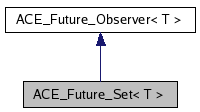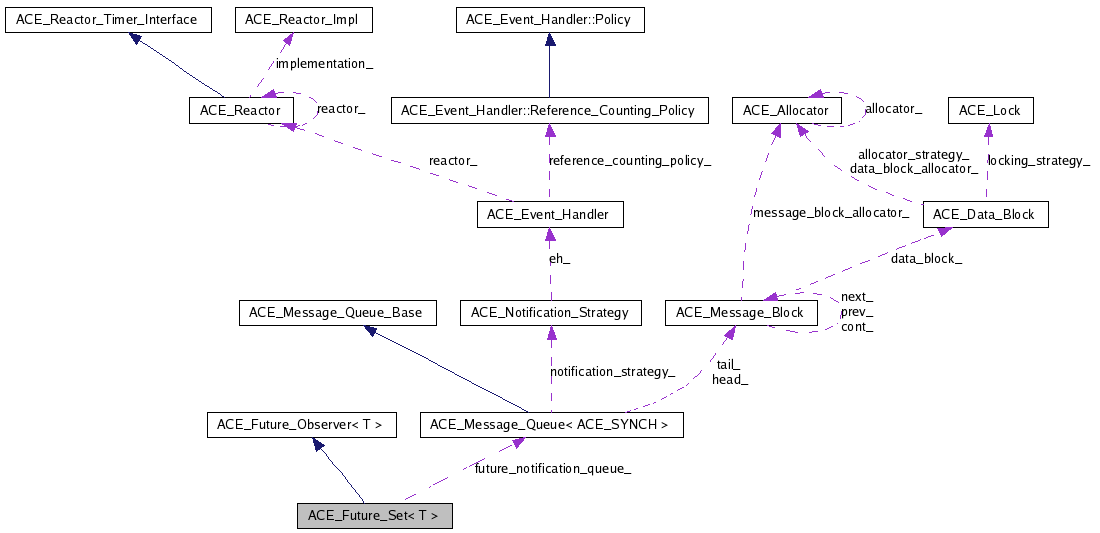ACE_Future_Set< T > Class Template Reference
This class implements a mechanism which allows the values of a collection of ACE_Future objects to be accessed by reader threads as they become available. The caller(s) provide the ACE_Future_Set (i.e. the observer...) with the collection of ACE_Future objects (i.e. the subjects...) that are to be observed using the the ACE_Future_Set::insert() method. The caller(s) may then iterate over the collection in the order in which they become readable using the ACE_Future_Set::next_readable() method. More...
#include <Future_Set.h>


Detailed Description
template<class T>
class ACE_Future_Set< T >
This class implements a mechanism which allows the values of a collection of ACE_Future objects to be accessed by reader threads as they become available. The caller(s) provide the ACE_Future_Set (i.e. the observer...) with the collection of ACE_Future objects (i.e. the subjects...) that are to be observed using the the ACE_Future_Set::insert() method. The caller(s) may then iterate over the collection in the order in which they become readable using the ACE_Future_Set::next_readable() method. Member Typedef Documentation
typedef ACE_Future<T> ACE_Future_Set< T >::FUTURE [private] |
typedef ACE_Future_Rep<T> ACE_Future_Set< T >::FUTURE_REP [private] |
typedef ACE_Future_Holder<T> ACE_Future_Set< T >::FUTURE_HOLDER [private] |
typedef ACE_Pointer_Hash<FUTURE_REP *> ACE_Future_Set< T >::FUTURE_REP_HASH [private] |
typedef ACE_Equal_To<FUTURE_REP *> ACE_Future_Set< T >::FUTURE_REP_COMPARE [private] |
typedef ACE_Hash_Map_Manager_Ex<FUTURE_REP *, FUTURE_HOLDER *, FUTURE_REP_HASH, FUTURE_REP_COMPARE, ACE_Null_Mutex> ACE_Future_Set< T >::FUTURE_HASH_MAP [private] |
Constructor & Destructor Documentation
| ACE_BEGIN_VERSIONED_NAMESPACE_DECL ACE_Future_Set< T >::ACE_Future_Set | ( | ACE_Message_Queue< ACE_SYNCH > * | future_notification_queue_ = 0 |
) | [inline] |
Constructor.
| ACE_Future_Set< T >::~ACE_Future_Set | ( | void | ) | [inline] |
Destructor.
| ACE_Future_Set< T >::ACE_Future_Set | ( | const ACE_Future_Set< T > & | ) | [private] |
Member Function Documentation
| int ACE_Future_Set< T >::is_empty | ( | void | ) | const [inline] |
Return 1 if their are no ACE_Future objects left on its queue and 0 otherwise.
When an ACE_Future_Set has no ACE_Future>subjects to observe it is empty. The ACE_Future_Set is in the empty state when either the caller(s) have retrieved every readable ACE_Future subject assigned the ACE_Future_Set via the ACE_Future_Set::next_readable() method, or when the ACE_Future_Set has not been assigned any subjects.
| int ACE_Future_Set< T >::insert | ( | ACE_Future< T > & | future | ) | [inline] |
Enqueus the given ACE_Future into this objects queue when it is readable.
Returns 0 if the future is successfully inserted, 1 if the future is already inserted, and -1 if failures occur.
| int ACE_Future_Set< T >::next_readable | ( | ACE_Future< T > & | result, | |
| ACE_Time_Value * | tv = 0 | |||
| ) | [inline] |
Wait up to tv time to get the value. Note that tv must be specified in absolute time rather than relative time.); get the next ACE_Future that is readable. If tv = 0, the will block forever.
If a readable future becomes available, then the input ACE_Future object param will be assigned with it and 1 will be returned. If the ACE_Future_Set is empty (i.e. see definition of ACE_Future_Set::is_empty()), then 0 is returned.
When a readable ACE_Future object is retrieved via the ACE_Future_Set::next_readable() method, the ACE_Future_Set will remove that ACE_Future object from its list of subjects.
| void ACE_Future_Set< T >::update | ( | const ACE_Future< T > & | future | ) | [inline, virtual] |
Called by the ACE_Future subject in which we are subscribed to when its value is written to.
Implements ACE_Future_Observer< T >.
| void ACE_Future_Set< T >::operator= | ( | const ACE_Future_Set< T > & | ) | [private] |
Member Data Documentation
| ACE_Future_Set< T >::ACE_ALLOC_HOOK_DECLARE |
FUTURE_HASH_MAP ACE_Future_Set< T >::future_map_ [private] |
Map of <ACE_Futures>, subjects, which have not been written to by client's writer thread.
ACE_Message_Queue<ACE_SYNCH>* ACE_Future_Set< T >::future_notification_queue_ [private] |
Message queue for notifying the reader thread of <ACE_Futures> which have been written to by client's writer thread.
bool ACE_Future_Set< T >::delete_queue_ [private] |
Keeps track of whether we need to delete the message queue.
The documentation for this class was generated from the following files:
 1.5.5
1.5.5